| 2003 was a demanding year for Keller, with a robust performance from all our specialist ground engineering businesses with the exception of Suncoast, which suffered from rising costs following the introduction of US tariffs on steel strand. | ||||||||||||||
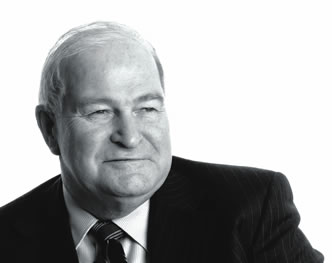 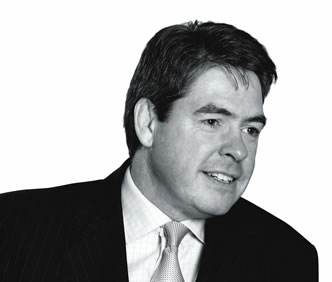 |
||||||||||||||
| 2003 was a demanding year for Keller, with a robust performance from all
our specialist ground engineering businesses with the exception of Suncoast, which suffered from rising costs following the introduction of
US tariffs on steel strand. This generally good performance was overshadowed
by a disappointing result from Makers, reflecting poor contracting margins
in its infrastructure business and low volume in social housing. Conditions in our major markets Given our broad geographic spread, we were once again subject to a variety of market conditions: US construction continued to be characterised by a healthy residential sector, broadly flat investment in public infrastructure and softness in the commercial sector. In Europe, we saw a further reduction in construction volumes in Germany and France, whilst public infrastructure spending sustained demand in our other principal European markets such as Austria, Poland and the UK. Australia, which continued its post-Olympics recovery, remained buoyant during the year. Whilst the Middle and Far East markets were generally subdued, there were several large projects which offered good opportunities. Strategic developments In December we announced our decision to concentrate on our core specialist ground engineering activities worldwide and to restructure our management and reporting along geographic, rather than product, lines. In the UK, we restructured the Keller Ground Engineering (KGE) business to focus on its higher value-added geotechnical and ground improvement solutions, streamline its processes and improve margins. Following weak trading at Makers, a new management team was appointed in December 2003 to refocus the business and ensure its return to profitability. The acquisitions of Keller-Terra and McKinney, both made in December 2002, were consolidated during the course of 2003. McKinney started the year slowly, with severe weather experienced in its principal trading areas, but recovered well and had an excellent second half. Keller-Terra traded very strongly, exceeding our expectations. Following the successful formula of extending our reach and introducing our market-leading technologies into new geographic regions, we progressed a number of initiatives which pave the way for future organic growth, including:
Operations North America The North American operations had a satisfactory year in challenging conditions. Sales of £270.4m (2002: £242.6m) were 11% ahead of the previous year, whilst operating profit before amortisation of intangibles of £19.3m (2002: £22.3m) was slightly behind the previous year, reflecting the £1.9m adverse impact of movements in the US dollar against sterling and reduced margins at Suncoast. Case had another good year, with a particularly strong result from Case Atlantic. Significant contributors to its result were the design and build contract to install a reinforced concrete diaphragm wall and internal bracing system to allow construction of an underground storage facility at the Field Museum in Chicago; and the Cross-town Expressway in Tampa, Florida. Case’s involvement in the latter project began in April 2003 and involves the installation of 220 large-diameter drilled shafts to support a five-mile elevated highway over the existing Cross-town Expressway. The second quarter improvement in the performance of McKinney was maintained throughout the second half, producing an encouraging result for McKinney’s first full year in the Group. During the year, McKinney successfully completed some 1,300 contracts, with an average contract value of £31k. The integration process has progressed well. 2003 proved to be a demanding year for Hayward Baker, whose results were held back towards the end of the year by a weak performance from its western region, where steps have since been taken to strengthen the operational management and to reduce overheads. The new branch office established in Boston at the end of 2002 made good progress during the year. Hayward Baker successfully completed a number of large and complex contracts during the year. These included a ground improvement contract at the George W Bush Turnpike project in Houston, using a combination of compaction grouting and lime injection on a landfill site to support construction of a new turnpike; a major soil mixing project for fuel storage tank support in Louisiana; and jet grout underpinning at the Supreme Court building in Washington DC. In contrast to its capacity to win and undertake these large, high profile contracts, Hayward Baker’s sales continue to be dominated by lower-risk, small and medium sized contracts, to which its regional structure is well suited. Suncoast increased its sales in the year by around 20%, including an increase of nearly 50% in combined sales from California and Arizona, marking progress in the strategy of reducing its reliance on the business’s traditional Texas market. During the year, the business faced material cost increases of 30% as a result of the tariffs on steel strand introduced in July and other price pressures in the steel industry. The full impact could only be partly mitigated by selling price increases and by manufacturing efficiency gains, leading to an erosion in Suncoast’s operating margin of around three percentage points. The material cost increases caused some competitor fall-out in the Florida and Georgia markets, which strengthened Suncoast’s market position on the East Coast. A more aggressive approach to pricing in 2004, together with further initiatives to reduce costs, is planned to help restore margins going forward. The new Sacramento office, which became full operational early in 2003, is enabling the business to expand further its operations on the West Coast and is expected to be a significant contributor in 2004. With a high proportion of housing starts still using traditional foundation methods, we believe that significant opportunities exist to gain further market share. Continental Europe & Overseas Our Continental Europe & Overseas business produced another very good performance, including an excellent first year contribution from Keller-Terra. Sales of £165.2m (2002: £135.6m) and operating profit before amortisation of intangibles of £13.8m (2002: £8.0m) were respectively some 22% and 72% ahead of the previous year’s strong results. Against a further decline in the German construction market, sales and profit in our German operation were broadly flat, although we detected signs of increased public infrastructure spending in Germany and the Netherlands towards the end of the year. The weak construction volumes in Switzerland, France and Portugal reported at the half year continued throughout the second half. Our operations in Austria and Italy achieved good results and we made further progress in penetrating the small, but growing, Eastern European market. In 2004, a new office in Poznan will become operational, giving us full territorial coverage in Poland. Keller-Terra, our 51%-owned Spanish subsidiary acquired in December 2002, had a very good first year, with an encouraging take-up of soil improvement techniques that were not previously well known in the Spanish market. The business undertook over 260 contracts during the year, spanning the residential, commercial, industrial, utility and infrastructure sectors. Significant contributions came from contracts related to highways, dam rehabilitation and slope repair. 2003 was another successful year for LCM, the Swedish lime column business. LCM sales increased by 36% and the transfer of the technology into new markets made good headway. Within the Overseas division, the Far East maintained its excellent performance, with good sales volume and productivity, despite the delayed start of two major ground improvement projects in Singapore. A significant contribution came from Malaysia, where we are undertaking grouting during the construction of storm water tunnels in Kuala Lumpur. The twin tunnels are thought to be the third largest in the world and will feature triple decks carrying both storm water and road vehicles. Our Middle East businesses generally performed in line with our expectations, with a good result from Egypt. Since the end of the year we have been awarded a €12m ground improvement contract at Palm Island – a prestigious development of hotels, shops and luxury homes to be built on a reclaimed island off the coast of Dubai. Keller’s work will involve densifying the sand, thereby improving the stability of the island to support utilities and structures. UK Sales in the year were £103.9m (2002: £106.7m), with operating profit before exceptionals and amortisation of intangibles of £0.5m (2002: £4.3m), respectively some 3% and 88% below the previous year. As we announced in our trading update on 1 December 2003, despite the actions taken earlier in the year, the weak first-half trading at Makers continued into the second half of the year. The disappointing result from Makers was mainly attributable to poor contracting margins in its infrastructure business, particularly in the highways division; weak trading from social housing outside the South East; and disappointing spend, leading to lower than anticipated volumes, in social housing refurbishment in London. As a result, Makers made a loss in the full year prior to exceptional items for restructuring and goodwill impairment. A new managing director, Peter Davis, with almost 20 years’ experience with the Keller Group, was appointed to Makers in December 2003, reporting directly to Justin Atkinson. Going forward, Makers will concentrate on social housing refurbishment in the South East, together with water and car park related concrete repair work. Since the appointment of Peter Davis, the business is stabilising and certain business lines that were loss making in 2003 have been discontinued, which has led to a further reduction in the cost base. Work in hand for the South East social housing business, which remained profitable throughout 2003, has improved recently. This should underpin a return to profitability for Makers during the course of 2004. As announced in June 2003, KGE’s mid-year withdrawal from large-diameter bored piling, focusing the business on its higher value-added ground improvement and geotechnical solutions, resulted in improved margins in the second half of the year. The restructured KGE business has retained some capacity in augercast and cast-in-situ piling, enabling the ground improvement division to continue its offering of integrated solutions. The success of this approach was illustrated in many of the contracts undertaken in the year, such as Cheetham Hill Retail Park, where a combination of vibro replacement, cast-in-situ piling and dynamic compaction was employed to provide effective and economic foundation support. The bulk of KGE’s ground improvement work comprised relatively small contracts for a wide range of house builders and property developers. KGE’s geotechnical division made good progress with its permeable reactive barrier system for the control of contaminated groundwater, with two large projects commencing towards the end of the year. 2003 also saw the identification of new applications for its soil mixing systems, such as quay wall remediation projects at Barking and Tilbury and a land rehabilitation project at Bow. In the slope stability arena, we carried out a number of contracts including soil nails for the M42 widening scheme, whilst the Comtec division installed temporary bunds at the Heathrow Terminal 5 project – at 18 metres high, the tallest bunds constructed in Britain. Australia Franki, which celebrated its 50th anniversary in 2003, ended the year with another strong performance, including a sound contribution from its Indonesian subsidiary. Major contracts included the foundations for “The Circle on Cavill”, a residential, retail and cultural development on Queensland’s Gold Coast; retaining walls for an access road to a new apartment block at Martha Cove in New South Wales; and a major pre-cast piling project at “Waterfront City” in Victoria’s Docklands. During the year Franki undertook a contract to supplement and underpin deficient foundations at the Gold Coast Convention Centre. This was the largest compaction grouting project ever carried out in Australia, for which Franki drew on technology developed elsewhere in the Keller Group. The success of this project illustrates the growing acceptance of ground modification techniques as an alternative to traditional piling in Australia and bodes well for Keller’s new ground improvement operations in the region. Vibropile, which completed its first full year within the Group, was affected by an overheated property market mid-year, but finished the year on a positive note. Known for its market-leading deep continuous flight augur techniques, Vibropile secured foundation contracts for major developments such as the “Victoria Points” apartments in Victoria’s Docklands and a new engine plant for General Motors in Port Melbourne. Maintaining our competitive edge Throughout 2003, Group companies have continued to modernise their systems of work and their equipment fleets to maintain their competitive edge through increased productivity and capability, for example:
These and other ongoing improvements in productivity and capability, combined with our planned further geographic expansion, will be key to securing our future growth. Tom Dobson Chief Executive Justin Atkinson Chief Operating Officer 11 March 2004 |
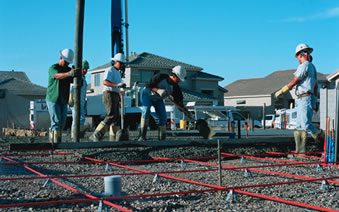 |
| North America Concrete placement for a 190 mm post-tensioned foundation slab supplied by Suncoast for a single family residence in Phoenix, Arizona. |
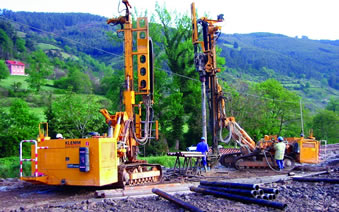 |
| Europe Keller-Terra uses micropiles and horizontal drains to stabilise the slopes of the new Cantabrico Highway between Lieres and Villaviciosa in the province of Asturias, Spain. |
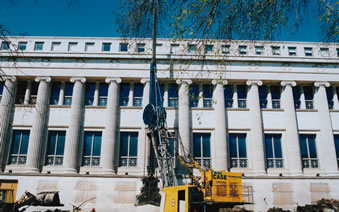 |
| North America Case Foundation installs a reinforced concrete diaphragm wall and internal bracing system to allow construction of an underground storage facility at the Field Museum in Chicago. |
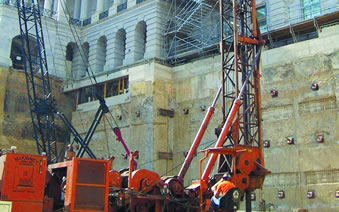 |
| North America McKinney Drilling constructs drilled piers for the Capitol Visitors’ Center, Washington DC. |
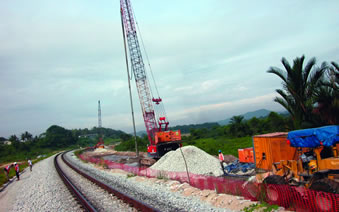 |
| Far East Keller uses its “Vibro Replacement” technique to stabilise the foundations for the new high speed electrified railway line between Rawang and Ipoh in Malaysia. |
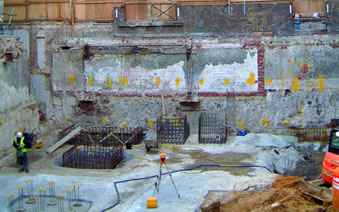 |
| UK KGE uses “Soilcrete” jet grouting to underpin an eight-storey structure, allowing construction of a seven-metre deep basement at a London University building in Torrington Place, London. |
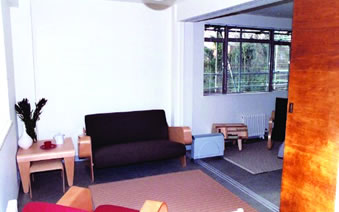 |
| UK Completed show flat for key workers in Camden’s Isokon Building, a 1930’s Modernist building under refurbishment by Makers, London. |
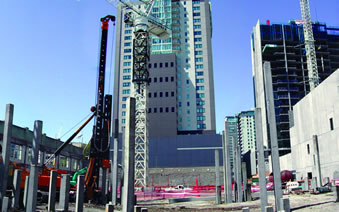 |
| Australia Franki installs pre-cast piles for the 37-storey Melbourne & City Towers residential apartments in the Southbank area of Melbourne. |